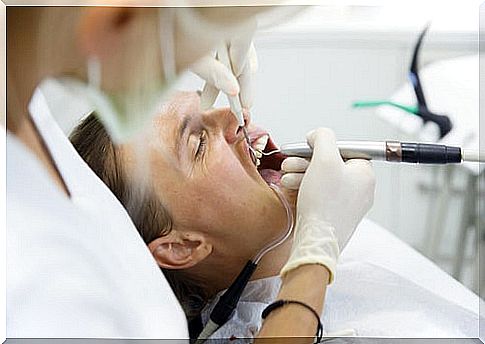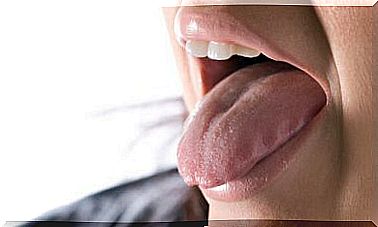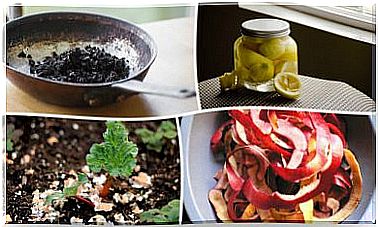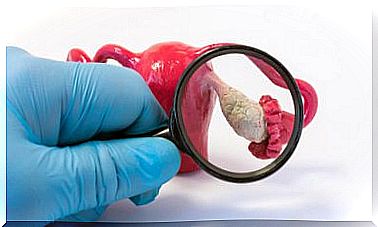Pyorrhea: How To Treat It Naturally?
In addition to maintaining proper dental hygiene, we can include foods in the diet that help relieve inflammation and reduce gum bleeding.

Periodontitis, or also known as pyorrhea, is a very common dental disease that, if not treated in time, can lead to an infection in the ligaments of the gums. As a consequence, the loss of teeth can occur.
It occurs because the alveolar bone that surrounds the teeth begins to be damaged as the periodontium deteriorates. To prevent the pyorrhea from getting worse it is necessary to make regular visits to the dentist.
Is it possible to treat this condition naturally? Next, we will talk about this disease and if there are natural remedies that improve pyorrhea.
Causes and symptoms of pyorrhea

There are different factors that can be behind this condition; however, the most common is a lack of proper oral hygiene. When this happens, bacteria grow more quickly and easily and accumulate between the gums, teeth, and molars.
With the excessive proliferation of these microorganisms, the gums become infected and inflamed. In addition, over time, they weaken the support of the teeth and are more likely to loosen or fall out.
In many cases, pyorrhea is not treated in time because there is initially no discomfort.
- In the case of noticing inflammation, infection or redness, it is important to consult with the dentist to prescribe the appropriate treatment and prevent the teeth from falling out.
- Pyorrhea does not cause serious discomfort that can interfere with daily life, so when the problem is detected it is too late.
- When this periodontal disease is in an advanced stage, bleeding, bad breath and pus discharge may be experienced.
Prevention of pyorrhea

Since the main cause of this problem is the accumulation of bacterial plaque in the mouth, it is essential to carry out proper dental hygiene. Experts advise brushing your teeth at least twice a day (morning and evening) and flossing after meals.
You can also rinse with mouthwash after lunch or dinner. Good dental health also depends on eating habits.
- If you eat a lot of sugar, germs and bacteria are more likely to grow quickly.
- Therefore, it is advisable to consume more fresh fruits (for example, apple) to help clean the mouth.
Are there home remedies for pyorrhea?
In the initial cases of pyorrhea some natural ingredients could have a positive effect in reducing inflammation and eliminating bacteria accumulated between the gums. However, the best method to prevent this disease is proper tooth hygiene.
Some of the most used home remedies are:
Lemon juice
Before using this remedy, you should consult your dentist, as lemon can weaken teeth and damage enamel. However, lemon has antiseptic properties.
The results of this study published in the journal Food Science & Nutrition suggest that these lemon and lime juice concentrates may have beneficial antimicrobial functions that can be harnessed to control unwanted microbial growth.
Remember to use a small amount to avoid staining the teeth.
- All you have to do is soak a cotton ball in lemon juice and pass it all over your mouth.
- Afterwards, don’t forget to rinse with lukewarm water.
Lettuce
Lettuce has soothing and anti-inflammatory properties, so it can be useful in gum problems.
- In the case of pyorrhea, you can chew well-washed raw lettuce leaves after each meal. Include it in your daily diet, as it provides many benefits.
Spinach juice

Spinach also has anti-inflammatory and antiseptic properties. In addition to consuming raw spinach in salads, you can prepare a juice or smoothie and drink it once a day.
Ingredients
- ½ cup of spinach leaves (15 g)
- 1 cup of water (250 ml)
Preparation
- Wash the spinach well and place in the blender glass.
- Add the water and mix well.
- Consume outside of meals.
Guava
It is a fruit rich in vitamin C that acts as a tonic for the teeth.
- All you have to do is eat some guava slices for dessert.
- You can also chew the young guava leaves to keep your mouth healthy and stop gum bleeding.
Is it possible to stop the progression of pyorrhea?
It is very important to visit the dentist regularly to monitor the health of the gums. It is also advisable to do a deep cleaning of teeth and gums, at least every 6 months.
If the pyorrhea is advanced, the dentist will likely recommend another treatment. This will focus on treating chronic gum disease with scaling and root planing.









